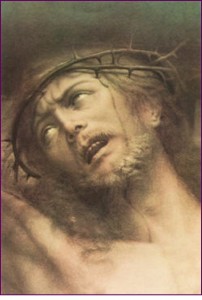The Gospel stories have many references to “demons”, and Jesus “casting out demons”. In fact, in Luke’ Gospel, at the end of the story of the temptations of Jesus in the desert, we see the phrase: “And when the devil had ended every temptation, he departed from him until an opportune time”. (Lk 4: 13). It’s as though the whole story of our redemption involves a struggle between light and goodness on the one hand, darkness and evil on the other, culminating in the seeming victory of darkness over light, at the Crucifixion. The prologue of John’s Gospel, however, contains the phrase “The light shines in the darkness and the darkness did not overcome it”. (Jn 1: 5).
In the time of Jesus, the activity of demons and the Devil was seen as a powerful influence on people’s behaviour and their health. Although it may be rather out of fashion, today, to speak in such terms about the Devil (Satan) and the demons, it seems the forces of evil are still very strong in our world, today, some two millennia later.
Perhaps, the main effect of the devil is to drive wedges between people, to divide them one from another. This happens in so many different ways and leads to the vice of anger – among many other vices – a feeling in individuals that is widespread and strong. I remember one day in the 1980′s, Fr. Tony Weber, a very experienced Swiss priest coming to visit me in Bamber Bridge. He had been in charge of forming priests in the charism of communion, and was accustomed to meeting priests from all over the world. He had been in East Germany, which in those days was in the grip of communism, and, despite the obvious dangers, used to hold secret meetings with Catholic priests. Given his presence and my involvement in one of the local prisons, I invited him to come and visit the chaplaincy and the prison. He came gladly, and we visited the prisoners’ quarters; in those days, this was quite possible. The all-male prison officers, in their enclosures on the wings, within the prison, used to decorate the walls with pictures of unclad ladies, something that never happens today, given a high percentage of women prison officers in the service. At this, my friend commented to me: “Under communism, the communist government used to divide people, one from another by spreading fear and mistrust through constant spying; in the Western world, where we have democratic freedom, we divide ourselves, one from another, by pornography”.
It is not really surprising that the Devil does this. In the letter to the Colossians, we read about Jesus: “All things were created through him and for him. He is before all things, and in him all things hold together” (Col 1: 16-17. The evil one is still rampaging around in our world, today, causing his mischief, as he is: “a murderer and the father of lies”, (John 8; 44), trying to trick us that, in sin, we will find our freedom. To overcome the forces of good which always lead to communion, friendliness, trust and love, the devil will go out of his way to destroy the source of all virtue: Jesus, himself, in our time, who is still alive and with us: the Way, the Truth and the Life: Jesus is Love made present in our midst, for those who have eyes to see.
When Jesus spoke those marvellous words: “Father, forgive them, for they do not know what they do”, (Lk 23: 34), he knew that this was the devil’s hour, the opportune time, and right to the end Jesus reacted with mercy, even in his agony, for in God’s mercy, lies the greatest witness to the strength of God. There is no mercy in Satan and his minions. But Jesus is full of mercy and love for each one of us, then on that first Good Friday as he was being nailed to the cross, and again today.
Let us, therefore, rejoice in the joy of the Gospel, for when we celebrate the Sacrament of Reconciliation, the priest forgives us in God’s name with these words: “God the father of mercies, through the death and resurrection of his son, has reconciled this world to himself”. The victory is won; light has overcome darkness, and the devil is defeated. Be wary, be wise, and recognise the Devil’s powerful activity in our world today!
In the first appearance of Satan, in the book of Genesis, we read after Adam and Eve had disobeyed God: “God said to the serpent, ‘Since you have done that, be cursed among all the cattle and the wild beasts! You will crawl on your belly and eat dust all the days of your life. I will make you enemies, you and the woman, your offspring and her offspring. He will crush your head and you will strike his heel’”, (Gen 3: 14). Mary is our all powerful ally in the fight against evil, division, hatred and lies. She leads us to Jesus where we find harmony, beauty, fullness of joy and a lightness and goodness about life.
Mary stands on the serpent by the saving power of Jesus.
Father Jonathan







